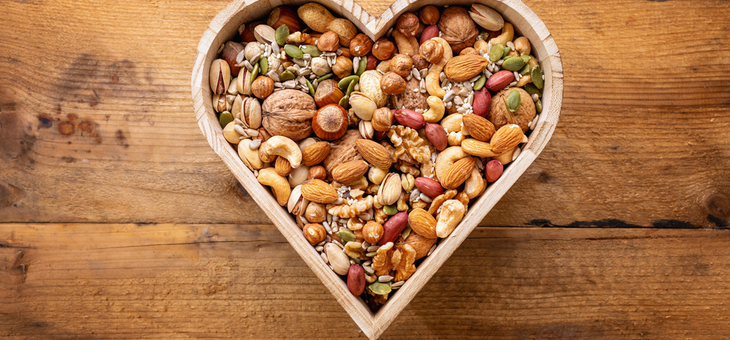If you listen to good nutrition advice you should know that including nuts in your diet has been linked to a lower risk of heart disease. But which nut is best?
If, like me, you are partial to a pistachio, you will be disappointed, but two recent studies present conflicting evidence on which nuts deliver the most heart health benefits.
The two nuts battling it out for your heart are pecans and walnuts.
Read: Light exercise for four hours a week increases stroke survivability
First, if you are not eating either of these nuts – or they don’t take your fancy – but are still eating the recommended 30 grams per day of other nuts, you will still be reaping the health benefits.
All nuts are good sources of healthy fats and are low in unhealthy saturated fats. They will all help make your heart healthy by reducing the level of ‘bad’ cholesterol (officially known as low density lipoprotein or LDL cholesterol) in the body.
LDL cholesterol can add to the build-up of fatty deposits in your arteries, which can increase your risk of heart disease.
Read: Is your health insurer passing on pandemic savings to you?
All nuts also help to maintain healthy blood vessels and blood pressure and reduce inflammation in the body because they are high in antioxidants.
However, a Spanish study has found that as well as the above benefits, walnuts also improve the quality of LDL particles in the body, while an American study found they were able to achieve significant reductions in LDL cholesterol by doubling the Australian recommended intake over a period of just eight weeks.
The Spanish study found that eating half a cup of walnuts every day for two years modestly lowered LDL cholesterol levels and reduced the total number of LDL particles and small LDL particles in healthy, older adults.
Read: Dissolving pacemaker could eliminate the need for some heart surgery
“Prior studies have shown that nuts in general, and walnuts in particular, are associated with lower rates of heart disease and stroke,” said study co-author Dr Emilio Ros.
“One of the reasons is that they lower LDL-cholesterol levels, and now we have another reason – they improve the quality of LDL particles.
“LDL particles come in various sizes. Research has shown that small, dense LDL particles are more often associated with atherosclerosis – the plaque or fatty deposits that build up in the arteries.
“Our study goes beyond LDL cholesterol levels to get a complete picture of all of the lipoproteins and the impact of eating walnuts daily on their potential to improve cardiovascular risk.”
In a sub-study of the Walnuts and Healthy Ageing study, a large, two-year randomised controlled trial examining whether walnuts contribute to healthy ageing, researchers evaluated whether regular walnut consumption, regardless of a person’s diet or where they live, had beneficial effects on lipoproteins.
The study was conducted over four years from 2012 to `16 and involved 708 participants aged between 63 and 79 from Spain and the US.
Among the key findings of the study were that those who ate walnuts daily reduced the total number of LDL particles by 4.3 per cent and small LDL particles by 6.1 per cent. The changes in LDL particle composition and concentration were associated with a lower risk of cardiovascular disease.
“Eating a handful of walnuts every day is a simple way to promote cardiovascular health,” said Dr Ros.
“Many people are worried about unwanted weight gain when they include nuts in their diet. Our study found that the healthy fats in walnuts did not cause participants to gain weight.”
Participants in the Pecan study, conducted by the University of Georgia, were limited to those at risk of cardiovascular disease.
The participants consumed 68 grams of pecans per day over an eight-week period and showed significant improvements in total cholesterol and LDL cholesterol.
“This dietary intervention, when put in the context of different intervention studies, was extremely successful,” said study author Professor Jamie Cooper.
“We had some people who actually went from having high cholesterol at the start of the study to no longer being in that category after the intervention.”
Researchers saw an average drop of 5 per cent in total cholesterol and between 6 and 9 per cent in LDL among participants who consumed pecans.
“The addition of pecans to the diet not only produced a greater and more consistent reduction in total cholesterol and LDL compared to many other lifestyle interventions but may also be a more sustainable approach for long-term health,” Prof. Cooper said.
“Some research shows that even a 1 per cent reduction in LDL is associated with a small reduction of coronary artery disease risk, so these reductions are definitely clinically meaningful.”
So which nut is best? All nuts are good, but there is vastly more research done promoting the health benefits of walnuts, so that could be the best nut overall.
Also, without arguing the science behind the University of Georgia study, it is worth noting that Georgia is the leading pecan producing state in the whole of the US.
Were you aware of the benefits of nuts? Do you like walnuts? Will you now try to include more in your diet? Why not share your thoughts in the comments section below?
If you enjoy our content, don’t keep it to yourself. Share our free eNews with your friends and encourage them to sign up.

